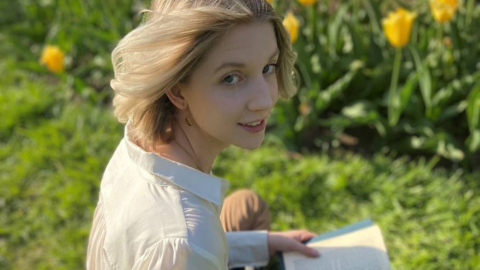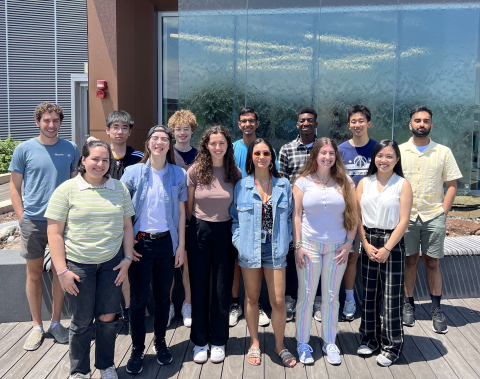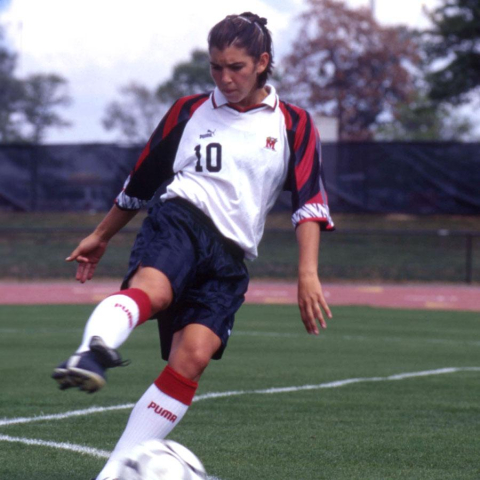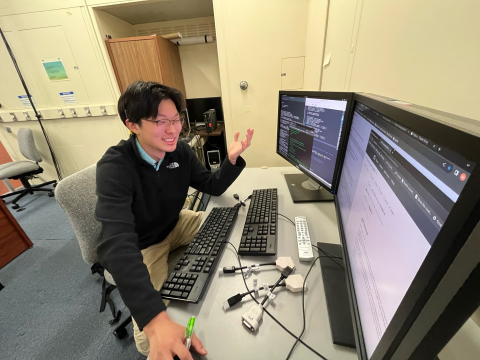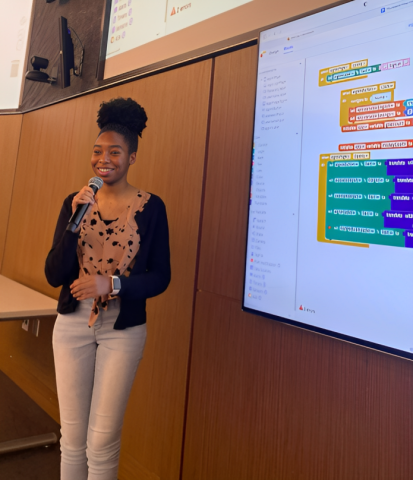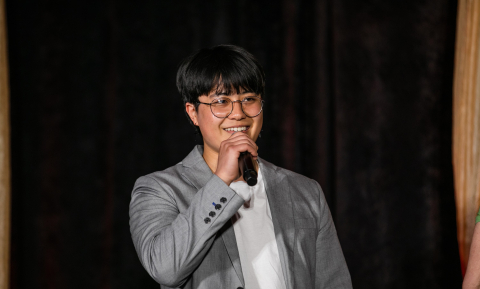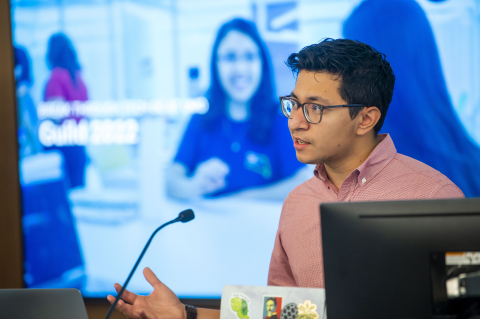Recent News & Accomplishments
2023
Undergrad Duran Keefe is Advancing Satellite Imaging Automation by Taking Part in a Forward Thinking Project at the Johns Hopkins Applied Physics Laboratory.
UMD undergrad Duran Keefe, a 2023 summer intern at the Johns Hopkins Applied Physics Laboratory (APL) in Laurel, Maryland, knows that people are a key part of any information system. “I’m fascinated by human-computer interaction, or human-centric computing — how people interact with machines,” said Keefe, an intern in the Laboratory’s Research and Exploratory Development Department (REDD). “I’m interested in processes and the connections between things, especially humans and machines.” During their time at APL, Keefe (who uses the pronouns they/them) worked on various assignments, including... read more
Manocha and Lin's Research, Highlighted by the Association for Computing Machinery’s Digital Library for its Groundbreaking Impact.
The University of Maryland's Department of Computer Science is celebrating a remarkable achievement in conjunction with the 50th anniversary of the renowned SIGGRAPH Conference, a cornerstone event in the global computer graphics community. To mark this special occasion, the Association for Computing Machinery’s Digital Library (ACM DL) highlighted groundbreaking papers from the last five decades across ten different areas. Among these selections is a paper co-authored by Distinguished University Professors, Dinesh Manocha , Ming Lin , along with a former Ph.D. student Stefan Gottschalk. This... read more
Tailored to serve the world's 480 million smallholder farms, Kestrel, a startup by Kamal Narra, offers a distinctive edge as a digital banking platform
In a world where technology often appears omnipresent, Kamal Narra, a computer science undergrad at UMD, is making an impact in an industry often overlooked by many tech entrepreneurs: agriculture. Customized for the world's 480 million smallholder farms, Kestrel, co-founded by Narra, is a digital banking platform with a unique approach. Unlike typical fintech applications, Kestrel focuses on a technology-first strategy that effectively bridges the challenging divide between farmers and financial institutions. This platform not only streamlines costs but also furnishes invaluable data, a... read more
UMD Students Participate in Competitive NSF-Backed Bioinformatics Program
From exploring the mysteries of the gut microbiome to researching the complexities of the COVID-19 virus, 14 undergraduate students from across the country recently spent the summer at the University of Maryland researching ways to help us better understand our health. The students were part of the highly competitive B ioinformatics R esearch I n D ata science for G enomics (BRIDGE), a program that’s supported by the National Science Foundation’s R esearch E xperiences for U ndergraduates (REU). Run by faculty and graduate students in the Center for Bioinformatics and Computational Biology (... read more
Sarver, an alum and an international soccer star, reflects on World Cup Experience
Keri Sarver was a Maryland legend on the soccer pitch from 1995 to 1998, helping the Terrapins make four consecutive NCAA Tournaments and holding the school record in every major offensive category upon graduation. Fast forward nearly two and a half decades later, and Sarver is continuing to leave her mark on the game—when she showcased her talent on the biggest stage the sport has to offer, the World Cup. While a Terp, Sarver (B.S. '99, computer science) was a two-time All- Atlantic Coast Conference Selection and was named an All-American in 1998. Sarver helped lead the Terrapins to four... read more
Delante Desouza '16 stars in a flashy role as Michael Cooper, who played his entire career in the NBA as a Laker, winning five championships with them
The Rise of the Lakers Dynasty is the superbly written and unabashed behind-the-scenes dramatization of the burdened ascent of arguably one of the greatest teams to ever play in the National Basketball Association, The Los Angeles Lakers. The series is an underdog comeuppance tale that only those who lived during the pre-fantastic years, or die-hard sports fans, would expect. In a near documentary-style dramatization, the stellar casting is also key to this sensational production's success and that, no doubt, includes UMD alum Delante Desouza (B.S. '16, computer science), who is back for... read more
Undergrad Morgan KO spent his summer as an intern at the National Institute of Standards and Technology and loved every minute of it
Morgan Ko, an undergraduate from the University of Maryland’s Department of Computer Science, has always been a creator at heart. From meticulously crafting sculptures as a child to now navigating the intricate mesh of technology and the physical world, his passions are evident. This summer, Morgan embarked on an internship at the National Institute of Standards and Technology (NIST) . While his academic interests align with robotics, his role at NIST plunged him into the depths of virtual reality. Tasked with refining the data storage techniques for VR, Morgan is not only enhancing NIST's... read more
Incoming freshman computer science major Gabrielle Gross learned to code in middle school at the University of Maryland
Gabrielle Gross discovered her love for coding at 11 years old in a University of Maryland summer camp. She followed this passion from summer camps to after-school programs to majoring in computer science in college, determined to learn everything she could about computing. “I love the puzzle-like aspect of coding. Similar to how it feels when you finish building a LEGO set, I get this sense of accomplishment and pride that I was able to create something functional,” Gross said. “Coding to me is like any other puzzle—frustratingly fun.” This fall, she will be back on campus as a freshman... read more
Noh is forging a new path as the Founder of ‘Sociable AI,’ an AI marketing tool enhancing brand communication
In the heart of the University of Maryland's Immersive Media Design program, one might spot Emerging Creatives undergrad Sung Hyun Noh engrossed in a degree program that brings together both the creative side of the arts and also the introductory elements of computer science. However, beyond his textbooks, Noh, accompanied by a committed team, is trailblazing a new path in the tech world as the Founder of Sociable AI , a conversational AI marketing platform designed to elevate brand communication. Sociable AI offers a cutting-edge conversational AI marketing solution for brands. The user-... read more
Elias Gonzalez, an alum and current computer science lecturer at UMD, leads inclusive teaching efforts in the department
When he was a first-generation Latino college student studying computer science at the University of Maryland, Elias Gonzalez didn't often see peers or mentors who looked like him or had similar lived experiences. Now, as a lecturer in computer science and curriculum innovation lead for Break Through Tech DC at UMD, Gonzalez (B.S. '17, computer science; M.Ed. ’18, curriculum and instruction) serves as that role model for students like him. And he is on a mission to ensure that the next generation of tech professionals is more diverse than it is today. “I loved the challenge and material, but... read more
